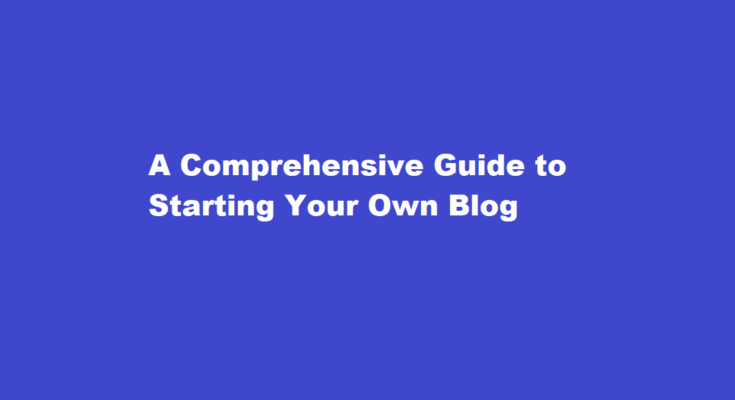Introduction
In the digital age, blogging has become a powerful platform for expressing ideas, sharing knowledge, and connecting with like-minded individuals across the globe. Whether you are an aspiring writer, a passionate hobbyist, or an entrepreneur looking to build an online presence, starting a blog can be an excellent way to make your mark on the internet. However, taking those initial steps can be overwhelming for beginners. In this comprehensive guide, we will walk you through the process of starting a successful blog, covering everything from choosing a niche to creating compelling content and attracting a loyal audience.
Finding Your Niche
Choosing the right niche is the foundation of a successful blog. Consider your interests, passions, and expertise. Identify a subject that not only excites you but also has an audience willing to read about it. Conduct thorough research to understand the current trends, potential competitors, and the target audience’s preferences. Strive to find a balance between your passion and the market demand to ensure your blog’s sustainability and growth.
Selecting a Platform
Selecting the right blogging platform is crucial for a smooth start. Popular platforms like WordPress, Blogger, and Squarespace offer user-friendly interfaces, customizable templates, and various plugins to enhance your blog’s functionality. Consider factors such as ease of use, design flexibility, and scalability while making your choice. WordPress, in particular, offers a self-hosted option, granting you complete control over your blog’s appearance and functionality, making it an ideal choice for most aspiring bloggers.
Picking a Memorable Domain Name
Your blog’s domain name is its online identity, so choose wisely. Aim for a memorable and easy-to-spell domain name that reflects your blog’s theme or your own brand. Keep it short, simple, and free of any hyphens or special characters. Perform a domain availability search to ensure it’s unique and available. Investing in a top-level domain (TLD) such as .com or .net can add credibility to your blog. Remember that your domain name is a long-term commitment, so take your time to make the right choice.
Designing Your Blog
An appealing and user-friendly blog design is essential for engaging readers. Customize your blog’s appearance to align with your chosen niche and personal brand. Choose a clean and easy-to-read font, complemented by a pleasing color scheme. Incorporate high-quality images and graphics to enhance visual appeal. Ensure your blog is mobile-responsive, as an increasing number of readers access content on their smartphones. A well-designed blog can leave a lasting impression on your visitors and encourage them to return for more.
Creating Engaging Content
Compelling content is the backbone of any successful blog. Plan your content strategy, focusing on providing value to your readers. Create a content calendar to maintain consistency in posting. Write engaging and informative articles that cater to your audience’s interests and pain points. Use a mix of written content, images, videos, and infographics to keep your blog visually appealing and engaging. Remember to use an authentic and relatable tone, making your readers feel connected to you and your blog.
Mastering SEO
Search Engine Optimization (SEO) is crucial for driving organic traffic to your blog. Research relevant keywords related to your niche and strategically incorporate them into your content. Focus on creating high-quality, shareable content to earn backlinks from other reputable websites. Optimize your blog’s meta tags, headings, and descriptions to improve its search engine rankings. Regularly update and refresh your content to maintain relevance and boost search engine visibility.
Engaging with Your Audience
Building a loyal readership requires genuine interaction with your audience. Respond promptly to comments and engage in discussions on your blog. Leverage social media platforms to share your content and connect with your readers. Encourage feedback and suggestions to understand your audience better and improve your blog. Collaborate with other bloggers in your niche and participate in guest posting to widen your reach. Building a supportive community around your blog can significantly contribute to its success.
FREQUENTLY ASKED QUESTIONS
How do bloggers get paid?
Bloggers make money in 5 main ways: Advertisements: selling space on their web page or website for companies to advertise on. Affiliate marketing: promoting a third-party’s products in exchange for earning a commission. Products: creating physical products to sell to their audience (e.g., merch)
Can blogging be a career?
As a blogger, you may consider turning your hobby into a full-time career. With tools and platforms that can help you reach audiences online, you can build a strong following and earn a living as a blogger.
Can a fresher do blogging?
Structured and formal education is not necessary to become a Blogger. However, it is advisable to complete at least a graduation to become a Blogger as you will have to conduct extensive research on varied topics according to your work requirements for reproducing the gathered information in your own words.
Conclusion
Starting a blog can be a rewarding journey, providing you with a platform to express yourself, connect with like-minded individuals, and potentially even generate income. By following the steps outlined in this guide, you can lay a strong foundation for your blog’s success. Remember, consistency, authenticity, and dedication are key factors in growing your blog and attracting a loyal audience. So, take the leap, find your voice, and start your blogging adventure today!
Read Also : Mastering a New Language A Comprehensive Guide to Language Learning



